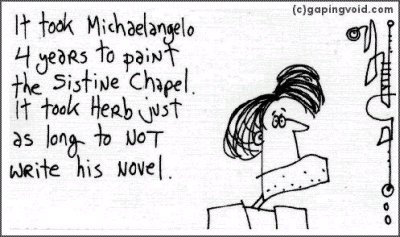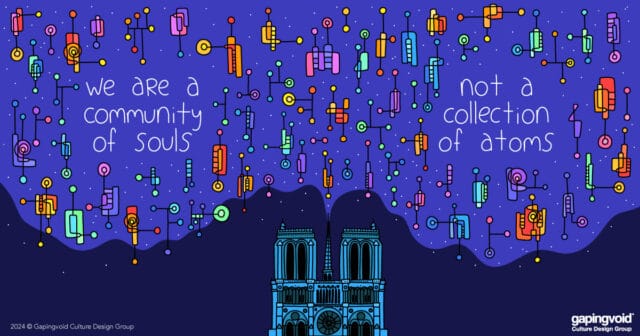
[More thoughts on “How To Be Creative”:]
36. Start blogging.
The ease with which a blog can circumvent the gatekeepers is staggering.
I have a friend in Paris. Call her Chantal. She’s a lovely woman, tres chic, very smart and sexy, with a cute apartment in the 20th Arrondissement and a respectable job in an advertising agency. A couple of years ago, she wrote a book. A novel. In French. Lots of sex and introspection [Sex & Introspection being a very popular French literary combo, of course]. Anyway, Chantal wants to get the book published.
The last time I dined with her in Paris, Chantal was telling me her tale of woe, after she had spent many long months schlepping around town, trying to find a publisher, which in Paris means trying to ingratiate herself with the Parisian literary scene. This is something that’s actually quite hard to break into, given the huge numbers of unpublished sex-and-introspection novels doing the rounds. One guy, an editor at some small imprint nobody outside of Paris has ever heard of, offered to help her, but eventually gave up once he figured out that she wasn’t going to sleep with him. You get the picture.
Being an avid blogger, of course, I was not very helpful.
“Your book has thirteen chapters,” I say. “Voila! That’s thirteen blog posts. One chapter per blog post. Put it online, and you’ll have a book offer within six months. Trust me.”
Of course, this is not how you do it in Paris, supposedly. You do it by going to all the right parties and hobnobbing with all the right people, supposedly. If you’re good at it, you get a book deal, supposedly. If you’re really good at it, they’ll also let you go on the highbrow TV talk show circuit and pontificate about “Couture” with all the other erudite culture vultures, supposedly. Maybe give you an occasional column in Le Figaro, supposedly. An intoxicating combo of both intellectual celebrity and bourgeoise respectability, supposedly. Very elite, supposedly. Very French, supposedly.
Sadly, she never went with the blog option. Sure, it could’ve worked quite easily [Hey, it worked easily enough for Tom Reynolds, the London ambulance driver who got a book deal based on his blog writings], but doing that would probably have been seen as a bit gauche by the other groovy cats in the Parisian literary scene. And I suspect she wanted membership into that club, every bit as much as she wanted to see her name in print.
Of course, as anybody who listens to NPR or the BBC will know, we have similar culturally elite hierarchies here in the English-speaking world, just maybe not so hardcore. There’s something strangely curious about how the idea of “The Novel”, “Le Roman” has such a strong hold on the French imagination; there’s something so heroic to them about the idea of the “Auteur”, that it’s hard to explain to people from more philistine parts of the world. On one level, you can easily admire such strong reverence to a classic archetype. On another level, such attachment can needlessly hold you back.
Whatever. If I were Chantal, I would still consider blogging the book in full. And I would post up an English version as well, to give the book the greatest chance of being read by people outside her French, urban microcosm. Sure, the Parisian literary purists will bitch and moan, but hey, they’re Parisian literary purists- they’re going to bitch and moan anyway.



